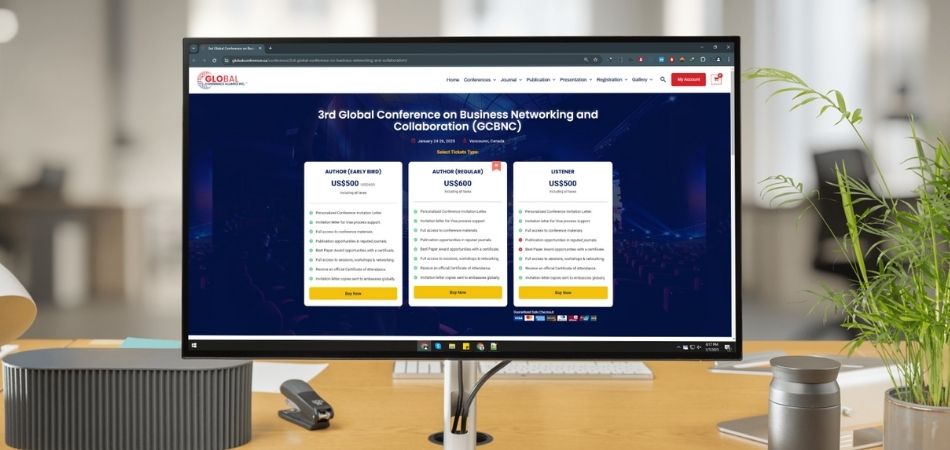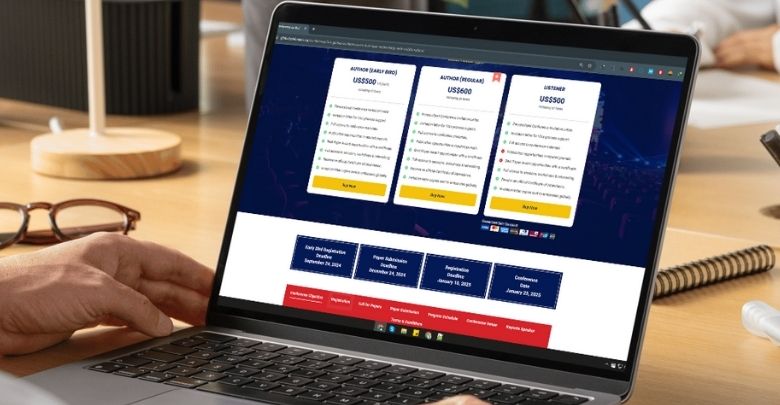Presenting at a business conference in Canada is an excellent way to showcase your expertise, connect with like-minded professionals, and gain recognition in your field. If you’ve ever asked yourself, “How do I apply to present at a business conference in Canada?” you’re not alone—it’s a question many aspiring authors have.
To present at a business conference in Canada, you have to research suitable events, craft a compelling proposal, and meet submission deadlines. Showcase your expertise, align with the theme, and emphasize the value of your presentation.
Ready to take the stage and make an impact? Continue reading to explore the steps and tips that will guide you toward presenting at a prestigious business conference in Canada.
How Do I Apply to Present at a Business Conference in Canada?
Sharing your insights, showcasing your expertise, and building meaningful professional connections are just some of the benefits of presenting at a business conference in Canada. However, dealing with the application process can seem complicated. With the below steps and preparation, you can confidently secure a spot as a speaker.

Identify the Right Conference
The first step is to find a conference that aligns with your expertise and professional goals. Research events that match your area of knowledge and interests, such as business management or industry-specific topics. Consider whether the business conference in Canada you’re interested in aligns with your field and audience expectations for maximum relevance.
Review Submission Guidelines and Deadlines
Every conference has specific guidelines for speaker applications, so review them thoroughly. Pay attention to requirements like word limits for abstracts, formatting preferences, and submission deadlines. Following these instructions precisely shows professionalism and increases your chances of acceptance.
Craft a Compelling Proposal
Your proposal is the cornerstone of your application. Focus on creating a clear and engaging abstract that outlines your topic and its relevance to the conference theme. Highlight the value attendees will gain from your presentation, making it specific, actionable, and aligned with the conference’s objectives.
Showcase Your Expertise
Include relevant achievements, publications, or past speaking engagements to demonstrate your authority on the subject. A well-crafted bio or portfolio adds credibility and reassures organizers that you can deliver a meaningful presentation. Be sure to emphasize your unique perspective or innovative ideas.
Reach Out for Clarifications if Needed
If you’re unsure about any part of the application process, don’t hesitate to contact the conference organizers. Asking thoughtful questions about the registration for a business conference in Canada or session formats can help you submit a polished and complete application.
Utilize Feedback to Improve Your Application
Before submitting, seek feedback on your proposal from colleagues or mentors. They can offer valuable insights into areas of improvement or clarify complex sections. This collaborative effort ensures your application stands out and meets the conference’s expectations.
Be Prepared for Follow-Ups
After submitting your application, prepare for potential follow-ups. Organizers may request additional information, like your presentation outline or references. Respond promptly and professionally to such requests to maintain a strong impression.
Focus on Networking to Boost Your Chances
Networking with event organizers or past speakers can provide insights into the selection process. Attending similar events before applying can help you understand what makes a presentation impactful. Building these connections can also increase your visibility in the community.
Keep Track of Application Status and Updates
Maintain a record of the conferences you’ve applied to and their deadlines. Regularly check your email for updates or announcements. Staying organized ensures you don’t miss any crucial communications from the organizers.
Prepare for a Successful Presentation
Once accepted, focus on preparing an impactful presentation. Practice your delivery, refine your slides, and gather relevant materials. Ensure your presentation aligns with the conference theme and provides actionable takeaways for the audience.
Presenting at a business conference in Canada requires careful planning and attention to detail, but the rewards are worth the effort. By following these steps, you’ll enhance your chances of being selected and making a lasting impact on the audience. Start your application journey today and seize this incredible opportunity.
Preparing Your Research: Key Steps to Take Before Applying
Submitting a presentation proposal for a business conference requires thorough preparation to stand out among applicants. A well-prepared research foundation is crucial to align with the conference’s goals and audience. These steps will help you organize and present your work effectively.
Define Your Core Message
Identify the key takeaway you want your audience to remember. Focus on a specific idea, insight, or solution that aligns with the conference theme. Craft your message clearly, ensuring it addresses a relevant problem or provides actionable value to attendees.
Conduct Thorough Background Research
Gather data, studies, or case examples to support your topic. Investigating similar presentations from past events can also give you insight into what resonates with the audience. A strong foundation is crucial when you submit research for presentation at a business management conference, as organizers value well-supported and relevant proposals.
Make Your Content to the Audience
Consider the type of professionals attending the conference and adjust your content accordingly. Use industry-specific examples and language that aligns with their knowledge level. Presenting information that is relatable and actionable for the audience increases your chances of making a strong impression.
Organize Your Research for Clarity
Structure your research into logical sections, such as an introduction, key points, and conclusions. Highlight the most impactful aspects to ensure your submission stands out. Organizing your content also makes it easier to adapt to different formats, such as workshops or keynotes.
Review and Refine Your Work
Seek feedback from colleagues or mentors to refine your research. Focus on eliminating redundancies and improving clarity to ensure your proposal is concise and engaging. Iterating through revisions strengthens your submission and boosts its chances of acceptance.
A solid research foundation is the backbone of any successful conference proposal. By taking these steps, you’ll create a compelling presentation that captures the attention of organizers and leaves a lasting impact on attendees. Start preparing today to promote your application!
Finding the Right Event: Tips to Select a Relevant Business Conference
Selecting the right business conference is key to making the most of your time and effort. A relevant event aligns with your professional goals, offers valuable networking opportunities, and provides actionable insights. Here are tips to help you find the perfect conference for your needs.
Identify Your Objectives
Start by clarifying what you want to achieve by attending a conference. Are you looking to learn new skills, connect with industry leaders, or showcase your expertise? Having clear objectives ensures you choose an event that aligns with your goals and adds tangible value.
Research Conference Themes and Topics
Examine the conference agenda and topics to see if they resonate with your field or interests. Events that address industry trends, challenges, or innovations offer the most relevance. Before you register for a business conference in Canada, ensure the themes align with your personal and professional growth objectives.
Consider the Target Audience
Pay attention to the type of professionals the event attracts. A conference attended by peers, potential clients, or collaborators is more likely to benefit you. Knowing the audience ensures you spend your time connecting with people who align with your goals.
Check the Credentials of Speakers and Organizers
Look into the speakers and organizers to assess the quality of the event. Conferences featuring experienced speakers and credible organizations usually offer high-value insights. This ensures you’ll gain knowledge and skills that can be applied effectively in your career.
Explore Networking Opportunities
Assess the conference’s networking sessions, such as workshops, panels, or meet-and-greets. These events offer a chance to expand your professional circle and connect with like-minded individuals. Strong networking opportunities can turn a good conference into a great one.
Choosing the right business conference requires thoughtful research and a clear understanding of your goals. By following these tips, you’ll find an event that aligns with your interests and maximizes your professional growth. Take the first step today and start exploring the perfect conferences for you.
Maximizing the Impact of Your Presentation: Feedback and Follow-Up
Delivering a presentation at a business conference is only part of the journey. To truly make an impact, seeking feedback and following up with your audience is essential. These steps not only upgrade your skills but also create meaningful connections that extend beyond the event. Below are some effective tips to follow:
Actively Seek Feedback
Engaging with your audience after the presentation allows you to gather valuable insights. Ask attendees for their thoughts on the content, delivery, and relevance of your presentation. Constructive feedback helps you identify strengths and areas for improvement, making your next presentation even more impactful.
Provide Follow-Up Materials
Sharing supplemental materials, such as slides, reports, or related resources, keeps the conversation alive. Attendees appreciate having something tangible to refer back to after the event. Providing materials also reinforces your expertise and encourages them to stay connected.
Build Relationships Through Personalized Follow-Ups
Take the time to reach out to key attendees or those who showed interest in your presentation. A personalized message referencing specific points discussed can leave a lasting impression. This effort not only strengthens relationships but also opens doors for future collaborations or opportunities.
Use Social Media to Continue Engagement
Posting about your presentation on platforms like LinkedIn extends its reach beyond the event. Encourage attendees to share their takeaways or tag you in posts about your session. This interaction boosts your visibility and positions you as a thought leader in your field.
Reflect and Improve for Future Presentations
Review your experience and feedback to identify what worked and what didn’t. Use these insights to refine your content, delivery, and engagement strategies. Continuous improvement ensures that your next presentation is even more impactful and aligned with audience expectations.
Feedback and follow-up are critical to turning a good presentation into a lasting impact. By adopting these steps, you’ll enhance your reputation, encourage valuable connections, and ensure your message resonates long after the event concludes.
Common Mistakes to Avoid When Applying to Present
Applying to present at a business conference can be an incredible opportunity to showcase your expertise and connect with professionals in your industry. However, even small missteps during the application process can hurt your chances of being selected. Here are common mistakes to avoid and tips to make your application stand out.
Submitting a Generic Proposal
A one-size-fits-all proposal is one of the most common mistakes applicants make. Adjust your abstract to the specific conference theme, showing how your topic aligns with the audience’s needs. Highlighting original insights and actionable takeaways ensures your proposal resonates with reviewers.
Overlooking Submission Guidelines
Ignoring or skimming over submission requirements can lead to disqualification. Pay attention to details such as word limits, formatting, and required documents. Following instructions carefully demonstrates professionalism and your ability to meet the event’s expectations.
Failing to Research the Audience
Presenting content that doesn’t match the audience’s expertise or interests can hurt your credibility. Investigate the typical attendees of the conference and modify your message accordingly. Aligning your presentation with their needs increases its relevance and impact.
Not Showcasing Your Expertise
Neglecting to emphasize your qualifications and experience can weaken your application. Include relevant achievements, publications, or speaking engagements to prove your authority on the subject. A strong bio reassures organizers that you can deliver a meaningful and professional presentation.
Missing Deadlines
Submitting your application late is a surefire way to ruin your chances. Set reminders to track important deadlines and complete your submission early to avoid last-minute issues. Punctuality reflects your reliability and respect for the organizers’ time.
Avoiding these common mistakes can significantly improve your chances of being selected to present. By putting thought and effort into your application, you’ll create a proposal that leaves a lasting impression. Take the time to prepare, and your hard work will pay off.
Frequently Asked Questions (FAQs)
When you are new to presenting at a business conference, it can be daunting. Here are some commonly asked questions to help you better comprehend the application process and increase your chances of success.
Can I Apply to Present if I’ve Never Spoken at a Conference Before?
Yes, many conferences welcome first-time speakers. Focus on crafting a compelling proposal that showcases your expertise and value to the audience. Highlight unique insights, relevant experience, or industry knowledge to demonstrate why you’re a great fit.
Do I Need to Submit My Full Presentation With the Application?
Not typically. Most conferences only require an abstract or outline of your proposed topic during the application process. Once accepted, you’ll have time to refine and finalize your presentation to align with the event’s guidelines and audience expectations.
Are There Fees Involved When Applying to Present?
It depends on the conference. Some events charge an application or registration fee for speakers, while others cover these costs for selected presenters. Check the event’s guidelines to understand the financial requirements before submitting your application.
How Can I Make My Application Stand Out Among Others?
Focus on crafting a proposal that’s specific, actionable, and relevant to the conference theme. Include clear objectives, practical takeaways, and a strong bio that highlights your expertise. A unique and well-organized submission increases your chances of being noticed.
What Happens if My Proposal Is Rejected?
Rejection isn’t the end of the road. Use any feedback you receive to improve your proposal for future opportunities. Consider attending the event as a participant to network, gain insights, and prepare for applying again next year.
Final Thoughts
Presenting at a business conference in Canada can be a rewarding experience, offering you the chance to showcase your expertise and connect with industry leaders. If you’ve wondered: How do I apply to present at a business conference in Canada, the process starts with preparation, passion, and persistence.
Focus on crafting a compelling proposal that highlights your unique insights and value. Take time to research conferences that align with your expertise and customize your application to meet their audience’s needs. Remember, clarity and confidence in your pitch can set you apart from the crowd.
Ready to take the stage? Apply today and share your knowledge with the world. With the right approach, presenting at a Canadian business conference can open doors you never imagined.







